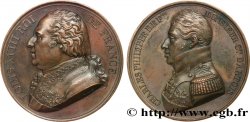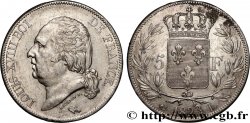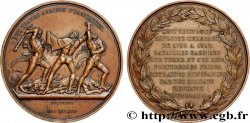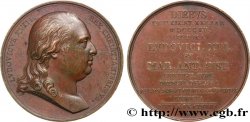fme_972281 - LOUIS XVIII Médaille parlementaire
100.00 €约 765.00 CNY
数量
加入购物车

种类 Médaille parlementaire
日期: 1818
材质 copper
直径 40,5 mm
模子方针 12 h.
硬币制模工 ANDRIEU Jean-Bertrand (1761-1822) / DE PUYMAURIN Jean-Pierre (1757-1841)
重量 40,52 g.
侧面 lisse
印模 sans poinçon
关于品相的说明
Belle patine marron hétérogène, légèrement irisée au revers. Petite usure sur certains hauts reliefs. Présence de quelques rayures
正面
正面的文字 LOUIS XVIII ROI DE - FRANCE ET DE NAVARRE..
正面的说明书 Buste à droite de Louis XVIII, signé : ANDRIEU F. et PUYMAURIN D..
背面
背面的文字 VIVE LE ROI // CHAMBRE / DES DÉPUTÉS // SESSION DE / 1818.
背面的说明书 Légende en deux lignes sous une couronne, dans une couronne de chêne.
评论
Exemplaire non décerné.
La Chambre des députés des départements (selon le titre exact de cette assemblée dans la charte de 1814), ou plus usuellement Chambre des députés, était une assemblée législative française instituée par la charte de 1814 et élue au suffrage censitaire.
Elle est constituée le 4 juin 1814 par les membres du Corps législatif de l’Empire, et compte alors 237 membres. Le 20 mars 1815, au début des Cent-Jours, elle est dissoute et remplacée en juin par une Chambre des représentants.
Après le retour de Louis XVIII, les élections des 14 et 22 août donnent aux ultra-royalistes ou ultras une majorité de 350 sièges sur 400. Le roi parle de « Chambre introuvable » ; gêné par son radicalisme réactionnaire, il la dissout le 5 septembre 1816, et le 25 octobre, les élections sont favorables aux « constitutionnels », c’est-à-dire aux modérés.
Les députés sont d’abord élus pour cinq ans et la Chambre renouvelée par cinquièmes. En application de la loi du 9 juin 1824, leur mandat est de sept ans et le renouvellement est intégral. Les élections, en 1827 et 1830, seront cependant provoquées par des dissolutions..
La Chambre des députés des départements (selon le titre exact de cette assemblée dans la charte de 1814), ou plus usuellement Chambre des députés, était une assemblée législative française instituée par la charte de 1814 et élue au suffrage censitaire.
Elle est constituée le 4 juin 1814 par les membres du Corps législatif de l’Empire, et compte alors 237 membres. Le 20 mars 1815, au début des Cent-Jours, elle est dissoute et remplacée en juin par une Chambre des représentants.
Après le retour de Louis XVIII, les élections des 14 et 22 août donnent aux ultra-royalistes ou ultras une majorité de 350 sièges sur 400. Le roi parle de « Chambre introuvable » ; gêné par son radicalisme réactionnaire, il la dissout le 5 septembre 1816, et le 25 octobre, les élections sont favorables aux « constitutionnels », c’est-à-dire aux modérés.
Les députés sont d’abord élus pour cinq ans et la Chambre renouvelée par cinquièmes. En application de la loi du 9 juin 1824, leur mandat est de sept ans et le renouvellement est intégral. Les élections, en 1827 et 1830, seront cependant provoquées par des dissolutions..








 对产品描述纠错
对产品描述纠错 打印
打印 分享我的选择
分享我的选择 提问
提问 Consign / sell
Consign / sell
 产品介绍
产品介绍









